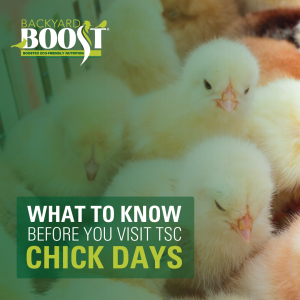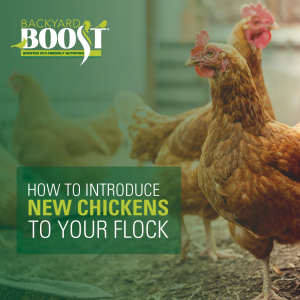
Chick days are coming, and you’ve decided to invest in some of these cute little fuzz balls. But you will need more than just a few baby chicks to start your new backyard farming venture. That’s why the Backyard Boost team compiled this guide for how to prepare for chick days.
We cover not just what you need in advance, but how to care for your new chicks and prep them for the coop. So, what’s the deal with how to prepare for chick days? Let’s get into it.
How To Prepare for Chick Days
There’s a lot that goes into not just caring for chicks but preparing for them too. If you’re a seasoned expert, you likely have some idea of what comes next. For new chicken purchasers, though, it can be overwhelming.
Here’s our step-by-step guide to how to prepare for chick days.
Step 1: Plan for Right Chicks
Before you even go to the local farm store, research what breed of chickens you are most interested in. The farm store you frequent will likely order the breeds that thrive best in that specific area, that are hearty and that are good layers. Contact your local store to find out which breeds they carry.
Often, if you are looking for a more exotic breed like an Easter Egger or Silkie, the store might be able to order them. Expect to have to agree to purchase a pre-specified amount, though.
Once you have decided on a breed or breeds, it’s time to go to the store and make your selection. Most hatcheries will only ship females or hens, but if you see a group of chicks labeled “straight run,” the hens and roosters were not separated, and there is a mixture in that group.
Step 2: Stock up on Supplies
So you’ve planned the chicks you want. Maybe you’ve even already ordered them. So what’s the next step for how to prepare for chick days? Get the essentials.
Prior to—or while—getting your chicks, you will want to get any supplies you need to make their lives comfortable and ensure they thrive. There are many options in the poultry aisle for your birds, but when raising chickens, the essentials include shelter, heat, bedding, feed and water.
Brooder
One of the most important components of how to prepare for chick days is setting up an environment for them to thrive early. Baby chicks initially need a small area to live in that will keep them contained and safe from predators, called a brooder.
For those not in the know: a brooder is a confined area ranging from a galvanized metal tank, wooden box, plastic tote or kiddie swimming pool. A DIY brooder box is always viable, but you can likely also purchase one from the farm store where you pick up your chicks.
At first, your chicks will need about a half-square foot of space. As they grow and mature, that will increase to about one square foot of space. Once they have outgrown their brooder and the weather is consistently warmer, you will want to move them to a coop with an outside pen.
Heat Lamps
Keeping your baby chicks warm is critical when they are little, as their bodies have not yet learned how to regulate their body temperatures.
Provide a heat lamp or heat bar that is close enough to provide them warmth yet far enough away that they won’t try to jump up at it. If they do, they could potentially burn or injure themselves. Only heat one area of the brooder so they have a place to go for warmth and a space to cool off.
Bedding Material
Bedding is another important aspect of keeping your chicks warm and healthy. Especially if using a plastic brooder, you will want to provide some bedding so the chicks don’t slip and slide, causing harm to their legs.
Bedding varieties include pine shavings, clean sand, paper towels, shredded newspaper and burlap. You should avoid cedar chips or other aromatic wood chips that can be toxic to chicks.
Feed
Feeding your baby chicks is simple, as you will need a chick starter feed and a chick feeder. Most chick feeders come with a divided trough to keep chicks from walking, playing in the food, or kicking it out into the bedding.
Raising the feeder slightly will help reduce contamination of the feed by the chickens messing in it and leaving behind feathers, dirt or feces. Once your birds are starting to grow and transition to a bigger size food, offer them Backyard Boost® Daily Essentials. Daily Essentials is a pelleted, natural protein supplement for all classes of poultry.
Not only rich with protein, Daily Essentials is also fortified with a prebiotic, vitamins, minerals and organic trace minerals. It also contains AO-Biotics® EQE, a postbiotic proven to enhance egg quality and production. Overall, the product helps maximize growth and egg production and supports overall flock health.
Water
Water is the most essential nutrient for animals and a key consideration with regards to how to prepare for chick days. After all, your new chicks are no exception. Ensure you provide your chicks with clean, fresh water each day. And clean the waterer each day to ensure it is free of dirt and waste.
The water dish should be shallow, or your chicks could accidentally drown. If the water dish is deeper, add a layer of pebbles to the bottom to keep it shallow enough to be safe. It will also weigh the dish down so it does not easily move or tip.
Step 3: Selection Process
Take time to observe the chicks before making your selection. Yes, chicks do take naps; they are babies, after all, but you want to choose a bird that shows some aggressiveness, is walking around, chirping and active.
Once you have selected your chicks and the store employee has picked them up, closely inspect them. Make sure their eyes are clear and bright. The chick should look you in the eye if you catch its attention.
Make sure the nostrils are clean and the beak is straight. Additionally, when the bird stands up, look to see if its feet and legs are straight so it won’t have problems walking.
Finally, check its bottom or vent to ensure no fecal matter is caked on—a sign of an unhealthy bird.
Step 4: Head Home
All that’s left, chicks acquired and ready to be cared for, is to bring your new additions to the flock home!
Planning Ahead: Making the Transition
Transitioning from brooder to coop can be like sending your firstborn to college. It is quite the change for your chicks and you. If your chicks are all one group and you don’t have older chickens, the transition is easier because you don’t have to worry about the older chickens bullying the younger chicks. Like anything, a gradual transition is best.
When you first get your chicks, the brooder should be a cozy 95 degrees. Each week lower the temperature by 5 degrees, so when it is about 70 degrees, the chicks acclimate to that temperature.
Next, make sure the coop is accessible to smaller birds. Are the perches, roosting boxes and any feeders and waterers low enough for the young chickens to use them? If not, a simple ramp is a quick fix.
As you transition your chicks, let them outside for a little while each day—an hour to start with and work up to 5 or 6 hours each day in an enclosed run that will keep them safe. Once they are used to being outside for most of the day, they will be ready to overnight in their coop. You may still need to provide a safe heat source, depending on how cool the nights get in your specific area.
How To Prepare for Chick Days? Turn to Backyard Boost!
One way to help make the transition smoother from the store to the brooder and brooder to the coop is to supplement your birds with Backyard Boost® Defense. This liquid supplement promotes feed and water intake during times of stress and recovery to help support digestive health and a healthy inflammatory response. Add it to their water daily for best results.
Backyard Boost® Defense is a liquid supplement for poultry designed to support digestion and a healthy immune response. Backyard Boost Defense contains AO-Biotics® Amaferm®, a prebiotic research-proven to enhance digestibility, and provides nutrients needed in times of stress. By adding this green liquid to their fresh water daily, you will promote water intake and hydration.
Once your birds start to grow and transition to bigger food, offer them Backyard Boost® Daily Essentials, a pelleted protein supplement for poultry designed to maximize digestibility and egg production. Daily Essentials also contains Amaferm. It also contains AO-Biotics® EQE, a postbiotic research proven to enhance egg quality and production. This supplement also provides nutrients needed for overall well-being.
Order Backyard Boost Today!
Now that you know how to prepare for chick days, it’s time to get to it! You can purchase your Backyard Boost products online or find a local retailer near you.
Would you like more information? Sign up for our monthly newsletter to receive timely information!

